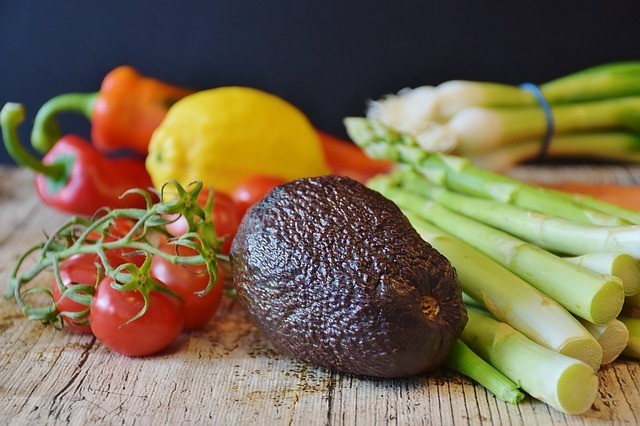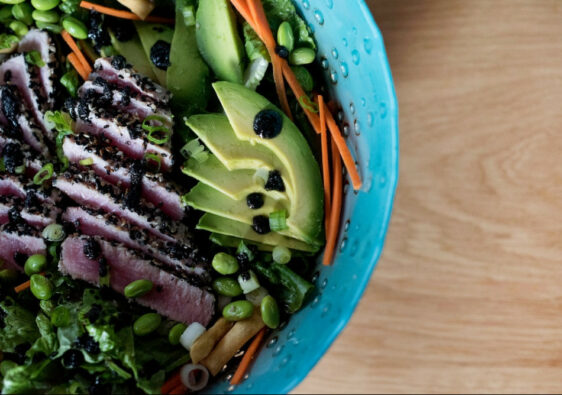In today’s post, I will talk about the differences between “low carb” and “keto” diets. What exactly are the differences between “low carb” and “keto” diets? There are a variety of low carb diets, however, keto diets have specific rules.

Low Carb Diet
So, “low carb” is a pretty broad term and does not really specify how low “low” is. That means that all low carb diets can variate from one another. For example, their is one “low carb high fat”, which is similar to the ketogenic diet, yet does not have the same goal as the ketogenic diet, which is to achieve ketosis.
In many low carb diets, it’s often even allowed to eat many fruits and vegetables, as well as refined sugars.
However, their’s really no concrete recommendations regarding the daily amounts of fat and proteins.
The diet is low carb so long as the daily consumed carbohydrates are LESS THAN fat and protein intake.
To sum up, the Low Carb Diet is generally constructed as:
- 50% fat
- 25% protein
- 25% carbs
Ketogenic Diet
The ketogenic diet actually started in the 1920s as a treatment for epilepsy and other neurological disorders.
The keto diet is also a type of low carb diet, but one with a very specific goal. The goal is to reprogram your metabolism so that you get your main energy from fats, rather than carbs.
On a keto diet, you should specifically consume no more than 50g of carbohydrates per day. It is very specific.
Why? That is the only way to achieve and maintain the long-lasting ketosis metabolism.
With the keto diet, it’s not enough to simply reduce your carb intake. It’s also not simply enough to “only” reduce the carb intake to no less than 50g a day.
The keto diet is generally constructed as:
- 50g carbs / day
- 70-75% fat
- 0.9-1.4g protein / kg
What is “Ketosis” again?
The keto diets specific goal is to reach ketosis metabolism, where your body uses fats rather than carbs for energy. It is simply what happens when your body experiences a drastic reduction of carbs.
Because of that reduction, your body makes more “ketone bodies“, which are these small molecules made from fatty acids in the liver. Those molecules, the ketone bodies, are what your body uses for energy after the glucose reserves of our body are emptied.
When the body is only given very little carbs (less than 50g/day) and our glucose reserves empty, the metabolism eventually adapts to this ketogenic metobolic state–ketosis or fat metabolism.
See, most people gain their energy from carbs. But when carbs their are no carbs, and more fat is added, the metabolism changes from glucose to ketones.
Ketones can be measured.
When you gain your energy from a normal diet that includes carbohydrates, you can measure between 0.1 – 0.2 mmol/l (millimole/liter) of ketones in the blood; with a low carb diet, perhaps 0.5 – 1.5 mmol/l.
During ketosis, you can find 1.5 – 3.0 mmol/l of ketones in the blood. Sometimes even up to 5.0 mmol/l can be found!
This value of ketones is precisely the difference between the keto diet and just a low carb diet.
Check out this post to learn more about measuring ketone levels.
Who Is the Keto Diet For?
The keto diet can help with
- weight loss,
- type 1 and 2 diabetes,
- cancer,
- neurological disorders, such as, dementia, epilepsy, Parkinson’s, and Alzheimer’s, etc.,
- digestive system disorders, such as, irritable bowel syndrome, fatty liver, Crohn’s disease, gastritis, etc.,
- respiratory disorders, such as, asthma, bronchitis, various allergies
Summary of Differences
- The macro nutrient distribution is different:
- Keto – less than 50g carbs / day
- Low Carb – fewer carbs than fat and protein / day
- The goals are different:
- Keto – reach ketosis; change your metabolism; lose weight
- Low Carb – not necessarily to reach ketosis as their are many varieties of low carb diets; lose weight, reduce blood sugars, etc.
- Ketosis can be measured:
- Keto – 1.5 – 3.0 mmol/l of ketones
- Low carb – 0.5 – 1.5 mmol/l of ketones
Conclusion
In today’s post I discussed what low carb and keto diets are. There are many variations of low carb diets, each having different rules and goals.
However, keto diet has set rules – less than 50g of carbs a day.
I hope you enjoyed the post! Leave your comments and questions below!
Thanks,
Anna
www.readyforketo.com






I love this article, a debt of gratitude is in order for sharing
a lot of information.
Thank you so much!! And thanks for dropping back by 🙂
Now it is making a lot of sense to me that keto diet is way better than low carb diet and should not be compared with one another. Low carb is just concentrated on reducing the carb intake and ensure that fat is more higher tan carb intake but yet, it does not reduce the essence of carb. Just that the carb would be taken in lesser volume. While keto is centered towards building us for a lifestyle of discipline in what w eat to achieve ketosis.
Rather interesting article you have written up here. Not an easy one but surely worthy of every bit of information on it. I really like your juxtaposition between keto diet and low carb diet. At firs, I always find it a herculean task differentiating between the two but your points stated here have given a clear distinction between the two diet plans. Well! I live by the keto diet and the goal of ketosis has not been achieved yet.
Well! I would say that the low carb diet is for people who are not strictly serious about quitting with their body fat and carb intake especially the processed and the refined one. However, if there were ever to be a need to achieve a lifestyle of not eating carbs and living without it, then keto diet would always be the perfect one. I like keto diet and the strict discipline that is required in its application to our lives.
First of all, thank you so much for making such a financial and gifting gift for all of us, After reading your article I am totally surprised because you have discussed so many nice details. We all want to control diet but we do not know the rules and we do not know how to control the diet. You have discussed about diet in detail and explained it.
I like keto diet. What this topic pretty well describes is how we can prevent cancer, And you have discussed further about neurological disorders, such as, dementia, epilepsy, Parkinson’s, and Alzheimer’s And you have explained through diet details how we can prevent this disease. I thank you once more
Hi there. Thank you for sharing this post on the difference between low carb and keto diet. I am familiar with the low carb high fat diet and not the low carb and keto diets (although I have heard of the term, Ketosis before now but never really had an idea what it meant); so I have learnt a lot from this post regarding low carb and keto diets and what Ketosis is.
Thank you so much for sharing.
Thank you for detailing the differences between ‘low carb’ and Keto diets. I think this is an area where many people who are wishing to get started with a Keto diet get confused.
Reflecting on the nutritional training I have, I personally think both low carb and Keto diets can be dangerous, and even life threatening, when little time is taken to learn the effects on the body of such diets. If not done in exactly the right fashion, the body can actually be damaged in the long term. Thank you for providing education for those wishing to obtain a state of Ketosis 🙂
Hi thanks for the post on Low Carb vs. Keto diet. This article was really interesting to me as I had never heard of the Keto diet before. I have tried a few fad diets that never work and actually ended up with me ever not sticking to it because it was to hard or me putting on more weight. The Keto diet sounds interesting I might research more of your other posts and see what it’s about.
Hello Anna!
An interesting article about two possible diets for us.
I cannot tell if I am respecting any of these two diets, but there are days when I don’t eat at all, and other days when I eat lots of bread (I like it). I am not measuring the exact percentages of carbohydrates, fats, and proteins; but recently there were also days when I ate protein-based food (yellow peas).
But generally, I am not setting exact percentages in my alimentation.
Best regards,
Peter
When I was small I do eat a lot of foods so this caused a great add up to my weight, then the doctor told me to reduced the way I eat but I told him I can’t because I love foods a lot am a (foodie) lol, then he came up with me eating some keto diets that it all help in my weight reduction which I did and trust me if you see me not I have changed a lot, .thanks for this great reviews about the keto diet it ll help many
It has always been a confusing subject of discourse when I have to differentiate between keto and low carb diet. It is really paramount to note that making use of keto diet requires one to live the live style and not just take it as just there. This is a massive one to which I believe would be essential for us all to take note. The goal of keto is quite unique and different. Hence, it should not be compared to low carb diet
Hi, thank you very much for publishing a great article with a nice title. “The Difference Between Low Carb and Keto Diet”. To speak the truth, before today I had no idea about low carb and keto diet. But After reading your informative article, I’m totally clear about the difference between these. Finally, I hope you will write more useful article in future.
Hey,Anna
In today’s post you discussed what low carb and keto diets are. There are many variations of low carb diets, each having different rules and goals.
That is a great post.
However, keto diet has set rules – less than 50g of carbs a day.
I enjoyed the post!
Hi Anna,
I recently did some research to nutrients (both macro and micro), and I found out that the minimum carbohydrate usage per day is at least 130 grams, depending on how active your lifestyle is. Nonetheless, a low carb diet can definitely help one reduce fat mass. Like you said, the body will resort to other kinds of fuel and thus start to burn fat (and probably muscle if you’re overdoing it).
In any case, I really like this article. It’s easy to read, yet full of scientific facts. If people are willing to burn of some fat, a low carb diet is definitely the way to go. Well, it should be combined with regular exercising, but still.
I’m rambling on. Keep posting articles like these! 🙂
Cheers!